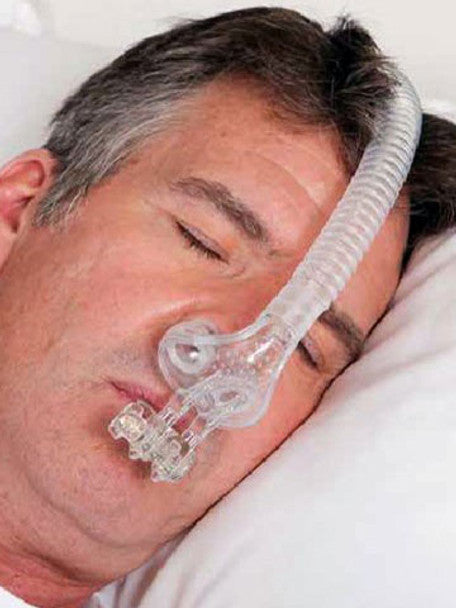As important as your CPAP machine is, the mask is equally important in ensuring that you can enjoy quality sleep apnea treatment. However, not all masks are created equal. Depending on your sleep habits, you may be better suited for nasal pillows or a full face mask — and this isn’t the only factor that goes into a proper mask fit.
Careful consideration of your CPAP mask options will help you find a fit that allows you to get a full night’s sleep. Here are the most important things to consider when choosing a mask.
Mask Type

One of the first considerations is the type of mask you should use. Full face masks cover both the mouth and nose, and are recommended for those who breathe through their mouth. This includes people with allergies, as well as those who are frequently congested and have trouble breathing through their nose. Full face masks work well for higher air pressure settings, and are a good fit for those who sleep on their back.
Nasal masks are a versatile option that covers the nose. They provide a natural airflow, and work well with high and low pressure settings. Because so many styles are available, nasal masks can work with almost any face structure. They are also a good choice for those who move around a lot in their sleep.
The smallest type of mask is a nasal pillow. Inserted into the nostrils, nasal pillows are best for lower air pressure settings. They are often recommended for men who have lots of facial hair, as well as those who experience claustrophobia with larger masks. Because nasal pillows don’t obscure the user’s vision, they are also a good pick for those who like to read or watch TV before going to sleep. Nasal pillows generally experience the least air loss of all CPAP mask varieties.
Mask Sizing
During your sleep study, a sleep specialist should fit you for a CPAP mask. This is done to minimize the risk for leaks and discomfort later on.
You want a mask that fits snugly, but not too tight. A mask that is too large is more likely to leak or shift out of position during the night. Alternatively, a mask that is too small will irritate your skin.
Most masks are available in multiple sizes based on your face measurements. Some also come with additional accommodations, such as a “wide” face fit. For a nasal mask, you will measure your nose length and width.
For full face masks, measure the distance from your lower lip to the area just beneath your eye, while in a natural position. The top should fit snugly at the bridge of your nose and completely cover your mouth.
Before buying a CPAP mask, you should check the manufacturer’s sizing specifications. While most use similar measurement guidelines for their sizes, it helps to double check so you don’t accidentally get a mask that is too big or too small.
CPAP Mask Accessories

In addition to the mask itself, you may wish to look into a few mask accessories that will make nightly use more comfortable. Chinstraps can help nasal mask users keep their mouth closed during the night to reduce the likelihood of mouth breathing.
Even with a proper fit, some people find the plastic of the CPAP mask to be uncomfortable against their skin. Mask liners help prevent direct contact between your skin and the plastic, while pads and cushions can improve mask fit.
Finally, don’t forget about mask cleaning accessories. Mask wipes will eliminate bacterial buildup inside your mask so you can stay healthy while using your equipment. Keep in mind that mask components will also need to be replaced on a regular basis due to wear and tear of the materials.
Don’t Be Afraid to Switch
If you experience trouble adapting to your CPAP therapy, it can sometimes be helpful to start by reevaluating your mask selection. Even if a mask seemed like it would be a good fit when you first did your sleep study, you might find that is no longer the case once you are using it every night.
A mask that is the wrong size may leave sores on your face, or cause dry eyes due to excessive leaks. You may also have selected the wrong mask style. For example, while nasal pillows may seem nice for some, they aren’t going to be effective if you frequently breathe through your mouth while sleeping.
If you are experiencing such problems after beginning sleep apnea therapy, don’t quit. Instead, speak with a sleep specialist, who can help you identify whether your mask is to blame and help you find a more comfortable solution.
Find the Right CPAP Mask For You
No matter what type of CPAP mask you think is right for you, you can find it here at No Insurance Medical Supplies. With masks from leading brands like Philips Respironics, Fisher & Paykel, ResMed, 3B Medical, and more, we make it easy to find the right match.
Even more importantly, we are here to help you save. Like so many of our CPAP machines, many of these masks are available at discounted prices to help those without health insurance save on this vital equipment. If you are making a larger purchase that also includes a CPAP machine, financing may be available so you can make more affordable monthly payments.
The right mask, paired with the right CPAP machine, will help you sleep better than ever before. Place your order today!
